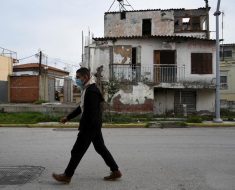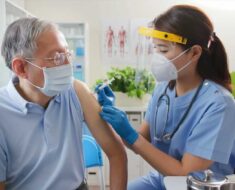Based on data from the United States, the people most at risk of severe outcomes due to COVID-19 are aged 85 and over, the Centers for Disease Control and Prevention (CDC) indicated in an official communication on March 18, 2020.

For live updates on the latest developments regarding the novel coronavirus and COVID-19, click here.
As the number of COVID-19 cases continues to rise in the U.S., the CDC have been keeping track of which groups face the greatest risk of exposure to the virus and which are most likely to experience severe symptoms of the resulting illness.
In a new official report, the federal agency now indicate that U.S. data largely confirm earlier findings in other countries. The data suggest that people who are older, or who have underlying health conditions, or both, are more likely to experience severe outcomes of COVID-19.
Previous findings suggested that adults over 60 are most likely to have severe symptoms.
The CDC report largely confirms this, while specifying that in the affected U.S. population, adults aged 85 and over have the highest risk of negative outcomes resulting from the illness.
CDC: Older adults should take precautions
The CDC COVID-19 response team who put together the current report looked at data from people in the U.S. with confirmed COVID-19 between February 12 and March 16.
The total number of cases officially recorded at that point was 4,226, and many of those affected lived in long-term care facilities for older adults.
The data came from people in 49 U.S. states, as well as the District of Columbia and three U.S. territories.
In assessing the data, the researchers took into account the severity of the disease, which they inferred from hospitalizations, admissions to intensive care units (ICUs), and reports of death. They went on to classify their findings by age group.
The report indicates that 31% of all confirmed COVID-19 cases, 45% of hospitalizations due to the disease, 53% of admissions to ICUs, and 80% of deaths occurred among people aged 65 and over.
Yet among the older population, those aged 85 and over had the highest prevalence of severe outcomes, the team reports.
At the other end of the spectrum, the CDC researchers found that no one aged 19 or younger had been admitted to an ICU or died due to the illness.
“Similar to reports from other countries, this finding suggests that the risk for serious disease and death from COVID-19 is higher in older age groups,” the CDC report states.
While the paper provides a helpful overview of the likely risk of negative outcomes in the U.S., the authors acknowledge that “The findings in this report are subject to at least five limitations.”
Among these limitations are missing relevant data concerning 9–53% of the cases analyzed and a lack of continuous followup for currently “active” COVID-19 cases.
The authors also caution that “Data on other risk factors [for negative outcomes related to COVID-19], including serious underlying health conditions that could increase risk for complications and severe illness, were unavailable at the time of this analysis.”
This means that the researchers were unable to confirm whether people with chronic health conditions have a major risk of experiencing severe outcomes.
Nevertheless, given the current findings, the CDC continue to advise older individuals — as well as the general population — to adhere to official best practices when it comes to preventing SARS-CoV-2 infection.
The foremost precaution, which everyone should follow, the specialists say, remains social distancing. They also advise that:
“Older adults should: maintain adequate supplies of nonperishable foods and at least a 30-day supply of necessary medications, take precautions to keep space between themselves and others, stay away from those who are sick, avoid crowds as much as possible, avoid cruise travel and nonessential air travel, and stay home as much as possible, to further reduce the risk of being exposed.”
For live updates on the latest developments regarding the novel coronavirus and COVID-19, click here.
For information on how to prevent the spread of coronavirus, this Centers for Disease Control and Prevention (CDC) page provides advice.
Source: Read Full Article





